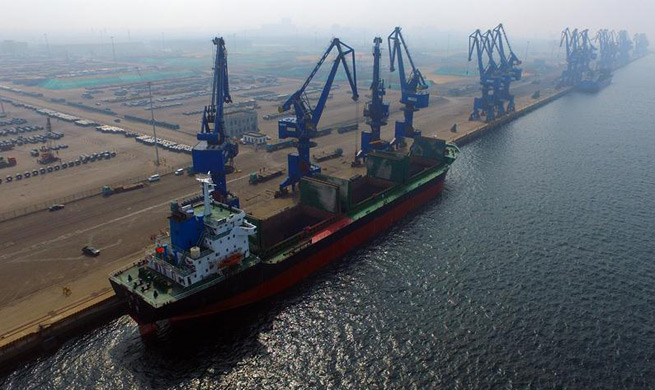RIGA, Sept. 8 (Xinhua) -- Although the Latvian economy is not currently facing a crisis like the one it experienced in 2009, it is showing some signs of overheating again, Bank of Latvia Governor Ilmars Rimsevics said at a news conference on Friday.
After weak performance in 2016, the Baltic country's economic growth has picked up this year, the head of the Latvian central bank said, noting that the recovery of the external markets was one of the main factors driving manufacturing growth in Latvia.
A stronger inflow of foreign direct investment (FDI) and EU funding, the delay of which was cited as the main reason hindering growth in 2016, has been another factor fueling economic activity this year, especially in sectors like construction, mining and quarrying, and the production of construction materials.
Wage growth and rising prices in the public sector have also contributed to the growth of Latvia's gross domestic product (GDP) this year, Rimsevics said.
"The temperature of the Latvian economy is increased now. But the situation is radically different from what we experienced during the years of economic boom," the Bank of Latvia governor said, explaining that inflation remained under control, lending growth had been weak, and the current account deficit had been growing at a rate of four to five percent, in contrast to a 10-to-12-percent rate in the period leading up to the crisis of 2009.
The main reasons for the current signs of overheating, in Rimsevics' view, have been caused by issues in the Latvian labor market where employment has risen to an all-time high, joblessness has dropped below the natural level, and entrepreneurs increasingly complain about workplace shortages, which in turn has resulted in rapid wage growth that has been faster than the growth of productivity.
Based on the Latvian economy's stronger growth in the first half of this year, increasing construction activity, as well as strengthening private consumption and a more favorable situation in the external markets, the Bank of Latvia has raised its GDP growth forecast for this year to 4.2 percent from 3.3 percent for this year and to 3.8 percent from 3.4 percent for 2018, Rimsevics said.
Considering the current trends in the economy, however, Latvia can ill afford an expansionary fiscal policy, the head of the central bank warned. Since economic growth has been so fast lately, it is necessary to follow a fiscal policy ensuring a surplus in the national budget, Rimsevics said.

















